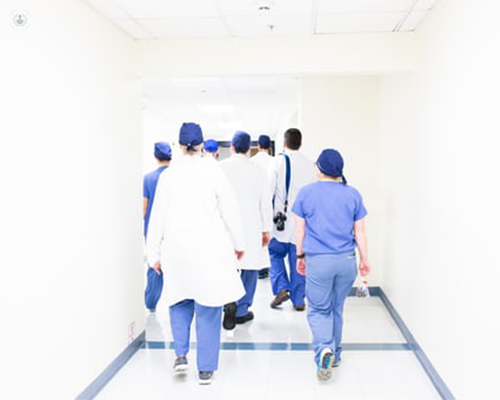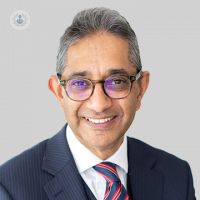COVID-19: head and neck cancer treatment advice
Written in association with:During the coronavirus pandemic, the government has worked with healthcare providers to put measures into place so that cancer patients can remain in touch with their cancer care team, and in more serious cases, may still have treatment.
We’ve spoken to one of our leading oral and maxillofacial surgeons Mr Bhavin Visavadia about these measures that have been put in place for head and neck cancer patients, whether they are newly diagnosed cases or if they have already had surgery, and what will happen when the pandemic restrictions begin to ease.

What do head and neck cancer patients need to know about coronavirus?
The information on the UK government website and in the news explains what everyone needs to know about symptoms of COVID-19, which includes a high fever and a cough.
If a patient does have symptoms of coronavirus, it is advised that they call 111. Some people may be ‘shielded’ as a result of their cancer and cancer treatment because they are at high risk of severe illness from coronavirus.
Cancer patients should follow the advice that would have been sent to them directly by their GP. If they have worrying symptoms for head and neck cancer, like a new diagnosis, they should proceed as normal, especially if they do not have COVID-19 symptoms.
Patients can now attend GP and dental clinics that have been closed for the last 10 weeks, as they have reopened. Urgent appointments are also available in my clinic.
What are the symptoms of head and neck cancer?
The symptoms of head and neck cancer include:
- A worrying ulcer in the mouth, which is present for more than three weeks
- Some unexplained pain
- A lump in the neck
- A red and white patch
How has COVID-19 disrupted consultations/surgeries with your patients?
Initially, when the lockdown was announced, all elective surgery was postponed and cancer surgery had to be diverted to centres that were COVID-19 negative. It was a big move to transfer patients, but in transferring patients to another centre we can undertake urgent cancer surgery. Acute hospitals are treating people with coronavirus.
What does a consultation for a head and neck cancer patient look like during the pandemic?
Currently, new patients get in touch with their GP. The GP then urgently refers the patient to a specialist. Patients can call me through Top Doctors or have a video call using the website’s e-consultation tool if they are worried.
If it is an urgent referral, which is known as a two-week-wait referral, each patient is then given the most urgent attention. They should expect a telephone call or video call from their specialist. If they have symptoms that need to be seen directly, the patient will need to be seen face to face wearing full personal protective equipment (PPE).
For head and neck cancer patients who have already had surgery, their care team is still available to support them, but remotely. We have a direct clinical nurse specialist who they, or their family member, can contact at any time. We can talk via video call or see the patient in the clinic if severe. All patients have a routine follow up anyway, which may take place remotely during this time.
What happens if a head and neck cancer patient displays symptoms of COVID-19?
If a head and neck cancer patient displays symptoms of COVID-19, they would need to call 111 to be assessed and treated according to the pathway. The patient takes priority and if they are admitted we would then need to manage them but wait for the COVID-19 symptoms to settle down.
What will happen when the pandemic eases and clinics will be back to running as normal?
The problem with the current crisis is that patients have not attended hospitals and have stayed at home. They want to protect the NHS and so we haven’t seen the usual number of patients come through. Therefore we are expecting a backlog and we expect patients to now start seeing their GP or dentist, as we do have the capacity and the manpower for consultations.
We would like to get things moving again. The process of visiting a doctor would involve a remote assessment first, then we follow a strict protocol where the patient’s temperature is checked.
They would complete a questionnaire. If there is no high temperature, they will be able to come into the clinic at an allocated time. The patient would go into a room to be assessed wearing PPE. Then the room is cleaned and decontaminated after the patient has gone, ready for the next person.
If you are worried that your are displaying symptoms of head and neck cancer, you can send Mr Visavadia a message via his Top Doctor’s profile here to organise a video call.


